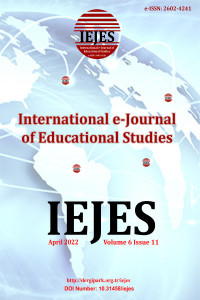Science Student Teachers’ Approaches to Studying
In this study, science student teachers’ approaches to studying was investigated. This is important because as knowing an individual’s preferred way for studying can potentially help teachers to design learning environments that is likely to better foster the individual’s learning needs. The participants were 381 student teachers on teacher education course during 2016/17 academic year. The Approaches and Study Skills Inventory for Students (ASSIST) was used to collect the data. The analysis of the data revealed that science student teachers’ approaches to studies showed statistically significant differences based on their gender, subjects and study years. The findings have important implications for teacher education courses.
Anahtar Kelimeler:
approaches to studying, student teachers, teacher education, science education
Science Student Teachers’ Approaches to Studying
iIn this study, science student teachers’ approaches to studying was investigated. This is important because as knowing an individual’s preferred way for studying can potentially help teachers to design learning environments that is likely to better foster the individual’s learning needs. The participants were 381 student teachers on teacher education course during 2016/17 academic year. The Approaches and Study Skills Inventory for Students (ASSIST) was used to collect the data. The analysis of the data revealed that science student teachers’ approaches to studies showed statistically significant differences based on their gender, subjects and study years. The findings have important implications for teacher education courses.
___
- Aslan-Efe, H., & Özmen, S. (2018). Ortaokul öğrencilerinin fen öğrenme becerilerinin incelenmesi. Journal of Computer and Education Research, 6 (11), 88-105.
- Biggs, J. (1999). Teaching for quality learning at university. London: Open University Press.
- Biggs, J. (2001) The reflective institution assuring and enhancing the quality of teaching and learning. Higher Education, 41, 221-238.
- Biggs, J., Kember, D. & Leung, D. (2001). The revised two-factor study process questionnaire: R-SPQ-2F. British Journal of Educational Psychology. 71,133-149.
- Biggs, J., & Tang, C. (2011). Teaching for quality learning at university. Maidenhead, UK: Open University Press.
- Case, J. & Gunstone, R. (2001). “No time to think”-interactions between students’ perceptions of time and approaches to learning, The Higher Education Close Up Conference 2, Lancaster University.
- Chan, K. (2003). Hong kong teacher education students’ epistemological beliefs and approaches to learning. Research in Education, 69, 36-50.
- Çolak, E., & Fer, S. (2007). Öğrenme yaklaşımları envanterinin dilsel eşdeğerlik, güvenirlik ve geçerlik çalışması. Çukurova Üniversitesi Sosyal Bilimler Enstitüsü Dergisi, 16 (1), 197-212.
- Dart, B.C., Burnett, P. C.& Purdie, N.M., (2000). Students’ conceptions of learning, the classroom environment, and approaches to learning. The Journal of Educational Research. 93(4), 262 - 270.
- Dunn K. & Dunn, R. (1986). The look of learning styles. Early Years 8: 46-52.
- Ekinci, N. (2009). Üniversite öğrencilerinin öğrenmeye yaklaşımları, Eğitim ve Bilim, 34 (131), 74-88.
- Entwistle, N. J. & Ramsden, P. (1983) Understanding student learning. London: Croom Helm.
- Enwistle, N.J. (2000). Approaches to studying and levels of understanding: The influences of teaching and assessment. In J.C. Smart (Eds.), (pp. 156-218). New York: Agathon Press.
- Entwistle, N., McCune, V., & Hounsell, J. (2002). Approaches to studying and perceptions of university teaching-learning environments: Concepts, measures and preliminary findings. Edinburgh: School of Education, University of Edinburgh.
- Entwistle, N.J. & McCune, V. (2004). The conceptual base of study strategies inventories in higher education. Educational Psychology Review, 16(4), 325-345.
- Kara, Y. & Özgün-Koca, S. A. (2004). Buluş yoluyla öğrenme ve anlamlı öğrenme yaklaşımlarının matematik derslerinde uygulanması: iki terimin toplamının karesi konusu üzerine iki ders planı. İlköğretim-Online, 3(1), 2-10.
- Marton, F. & Saljo, R. (1976). On qualitative differences in learning-I: outcome and process. British Journal of Educational Psychology, 46, 4-11.
- Mattick, K., Dennis, I., & Bligh, J. (2004). Approaches to learning and studying in medical students: validation of a revised inventory and its relation to student characteristics and performance. Medical Education, 38(5), 535-543.
- Olpak, Y. Z., & Korucu, A. T. (2014). Öğrencilerin ders çalışma yaklaşımlarının farklı değişkenler açısından incelenmesi. Ahi Evran Üniversitesi Kırşehir Eğitim Fakültesi Dergisi,15(1),333-347.
- Ozan, C., & Çiftçi, M. (2013). Eğitim fakültesi öğrencilerinin öğrenme yaklaşımları tercihleri ve öğrenmeye ilişkin algılarının incelenmesi. Pegem Eğitim ve Öğretim Dergisi, 3(1), 55-66.
- Ozan, C., Köse, E., & Gündoğdu, K. (2012). Okul öncesi ve sınıf öğretmenliği öğrencilerinin öğrenme yaklaşımlarının incelenmesi. Eğitim Bilimleri Araştırmaları Dergisi, 2(2), 75-92.
- Pimparyon, P., Poon, B., Roff,S., McAleer, S., & Pemba., (2000). Educational environment, student approaches to learning and academic achievement in a Thai nursing school, Medical Teacher, 22(4), 359-365.
- Richardson, J.T.E (2011). Approaches to studying, conception of learning and learning styles in higher education, Learning and Individual Differences, 21, 288-293.
- Ritchie, J., Lewis, J., Nicholls, C. M., & Ormston, R. (Eds.). (2013). Qualitative research practice: A guide for social science students and researchers. Sage.
- Rowe, J.W.K. (2002). First year engineering students’ approaches to study. Int. J. Elec. Eng. Educ., 39 (3), 201-209.
- Senemoglu, N. (2011). College of education students’ approaches to learning and study skills, Education and Science, 36(160), 65-80.
- Tait, H., Entwistle, N. J, & McCune, V. (1998). ASSIST: a re-conceptualization of the Approaches to Studying Inventory. In C. Rust (Ed.), Improving Students as Learners (pp.262-271). Oxford: Oxford Brooks University.
- Vermetten, Y.J., Lodewijks, H.G., & Vermunt, J.D. (1999). Consistency and variability of learning strategies in different university courses. Higher Education, 37, 1-21.
- Yiğit N., Devecioğlu, Y., & Ayvacı, H. Ş. (2002). İlköğretim fen bilgisi öğrencilerinin fen kavramlarını günlük yaşamdaki olgu ve olaylarla ilişkilendirme düzeyleri, V. Ulusal Fen Bilimler ve Matematik Eğitimi Kongresi, ODTÜ, Ankara.
- Başlangıç: 2017
- Yayıncı: Tamer KUTLUCA
Sayıdaki Diğer Makaleler
Ortaöğretim Matematik Dersi Öğretim Programının Uygulanmasına Yönelik Öğretmen Görüşleri
Mehmet AYDIN, Seval LAÇİN, İsmail KESKİN
Kelime Oyunları ile Fen Öğretiminin Öğrencilerin Çevreye Yönelik Tutumuna Etkisi
Nilay KEFELİ, Erol TAŞ, Mübeccel YALÇIN
